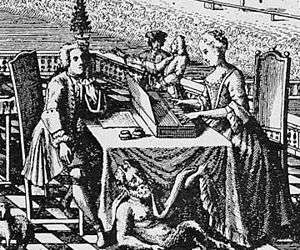Johann Sigismund Scholze
Johann Sigismund Scholze alias Sperontes (20 March 1705 in Lobendau bei Liegnitz (today Lubiatów near Złotoryja) 28 September 1750 in Leipzig) was a Silesian music anthologist and poet.
Life
Little is known about the life of Scholze. He was the son of a clerk, and attended school in Liegnitz until the beginning of his studies in Leipzig. In 1729 he was in Leipzig, where on 3 January, he got married with the widow from Halle, with whom he had begun a relationship. The children died young. Only one survived him. His wife died on 12 February 1738. His own funeral in poorer shape was on 30 September 1750.[1] Stolze published under the pseudonym of Sperontes. We owe the discovery of the real identity of the poet to the musicologist Philipp Spitta, who published in 1885 a fundamental work Sperontes.[2]
Works

- Sperontes, singende Muse an der Pleisse, Leipzig, 1736
- Das Kätzgen, ein Schäferspiel, Leipzig 1746
- Die Kirms, Leipzig 1746
- Das Strumpfband, Leipzig 1748
- Der Frühling
- Der Winter
Sources
- Robert L. Marshall and Dianne M. McMullen's article in new Grove Dictionary of Music
- P. Spitta: 'Sperontes "Singende Muse an der Pleisse": zur Geschichte des deutschen Hausgesanges im 18. Jahrhundert', 1885
- A. Kopp: 'Gedichte von Günther und Sperontes im Volksgesang', Zeitschrift für deutsche Philologie, xxvii, 1895
- J.W. Smeed: German Song and its Poetry, 1740–1900, 1987
- S. Kross: Geschichte des deutschen Liedes, 1989)
Notes
- Reinhard Kade: Johann Sigismund Scholze. In: Allgemeine Deutsche Biographie (ADB). Band 32, Duncker & Humblot, Leipzig 1891, S. 231–233.
- Philipp Spitta: Sperontes' „Singende Muse an der Pleiße“, Vierteljahresschrift für Musikwissenschaft 1 1885, S. 35–126 und 350–355
- "The Face of Bach by Teri Noel Towe". Archived from the original on 16 July 2011. Retrieved 14 May 2007. – web page on archive.org accessed 2012-10-29, the original page is no longer accessible
External links
- Free scores by Johann Sigismund Scholze at the International Music Score Library Project (IMSLP)
- Biography at Ostdeutsche Biographie (in German)